牛津深圳版九年级下册期末知识点复习课件(共49张PPTwps打开)
文档属性
| 名称 | 牛津深圳版九年级下册期末知识点复习课件(共49张PPTwps打开) | 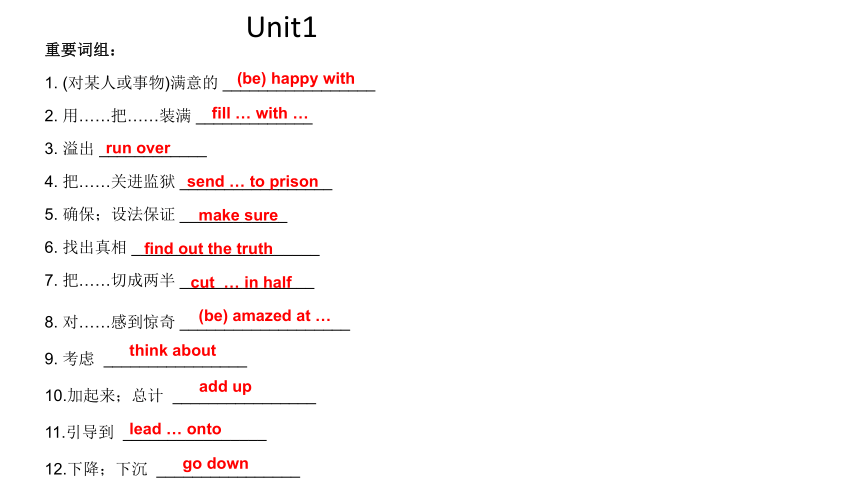 | |
| 格式 | zip | ||
| 文件大小 | 716.4KB | ||
| 资源类型 | 教案 | ||
| 版本资源 | 牛津深圳版 | ||
| 科目 | 英语 | ||
| 更新时间 | 2020-06-27 10:36:42 | ||
图片预览

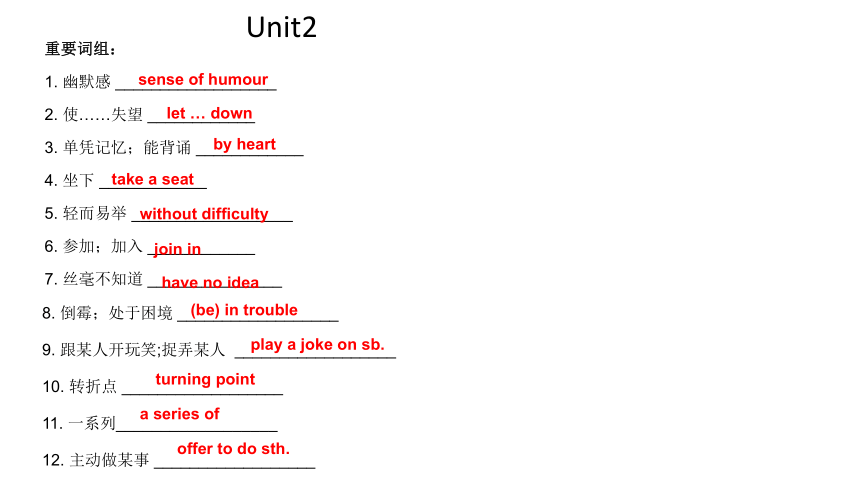
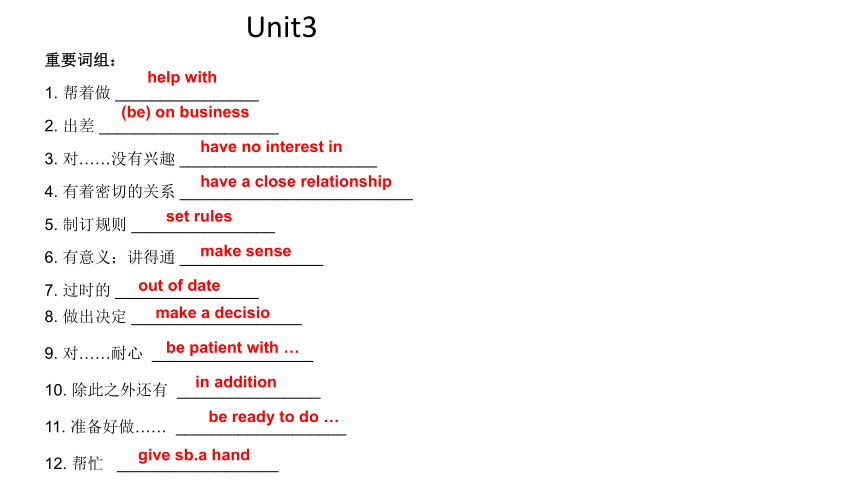
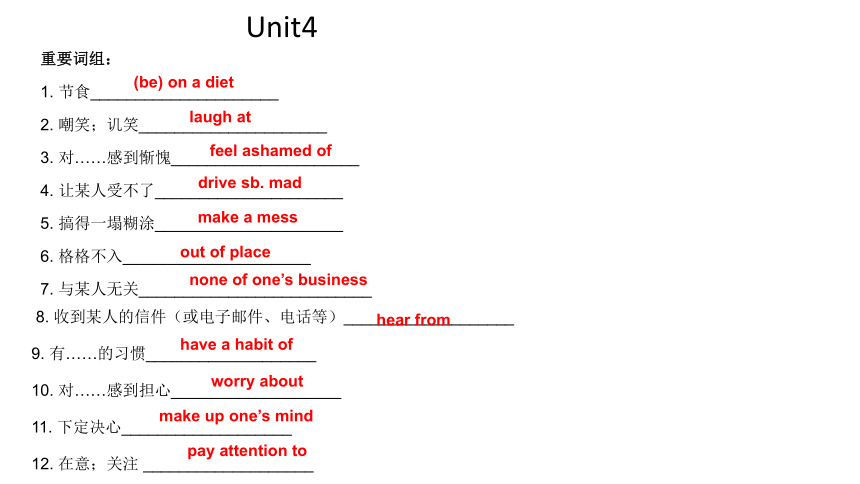
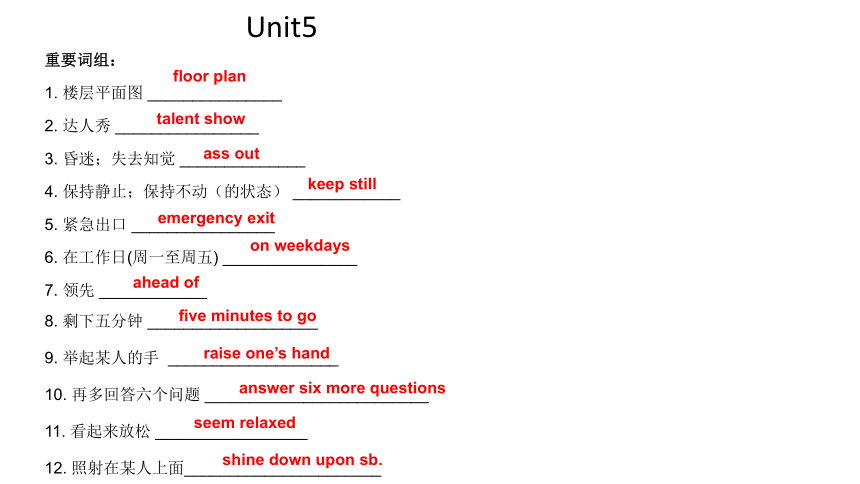
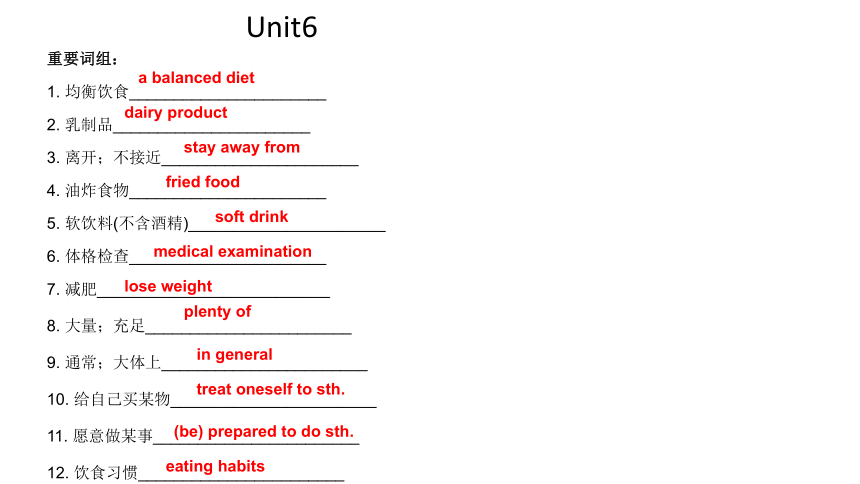
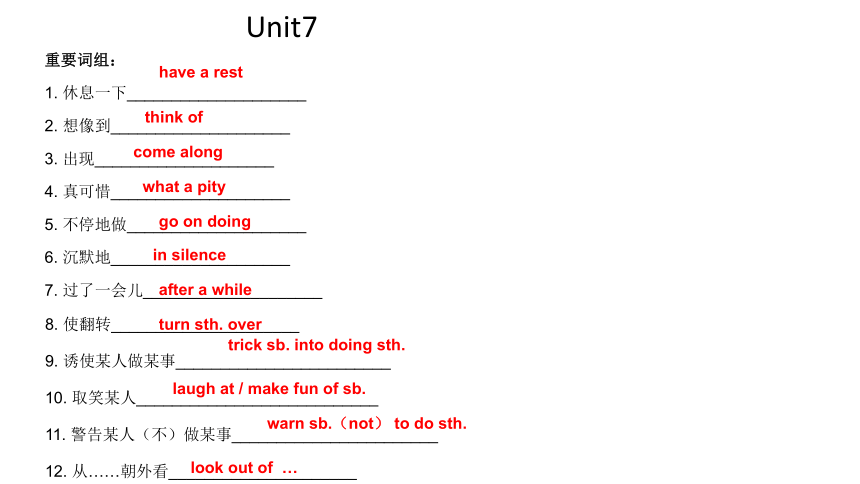
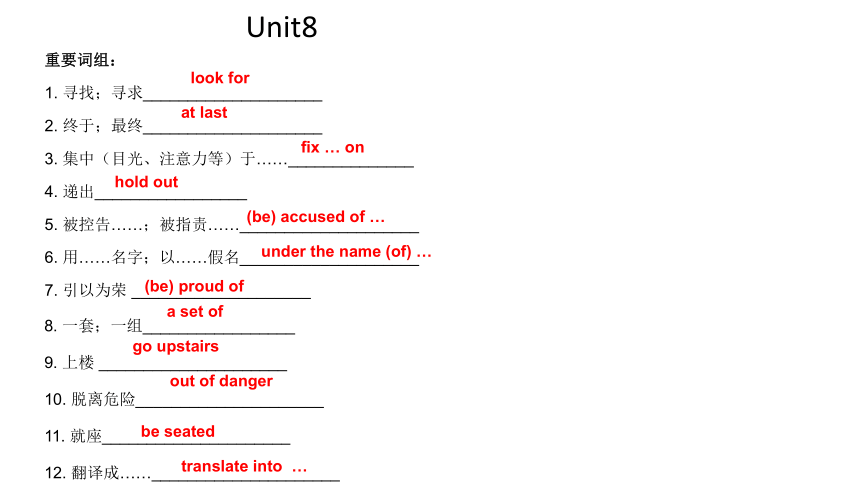
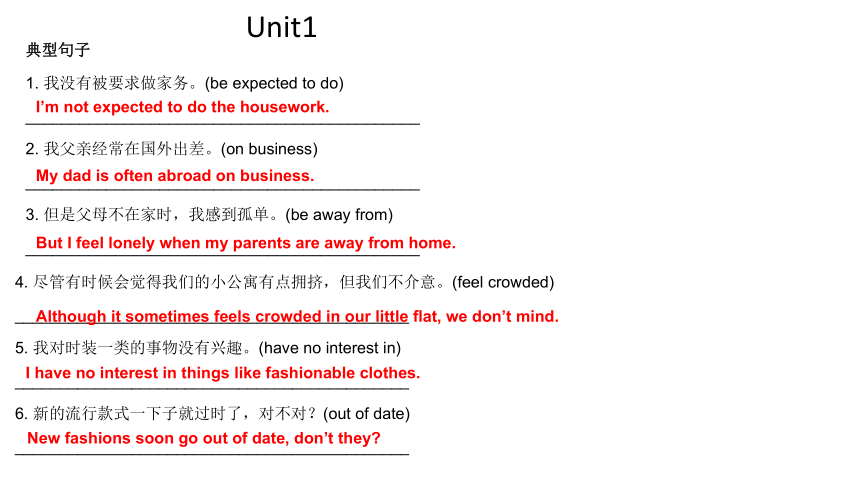
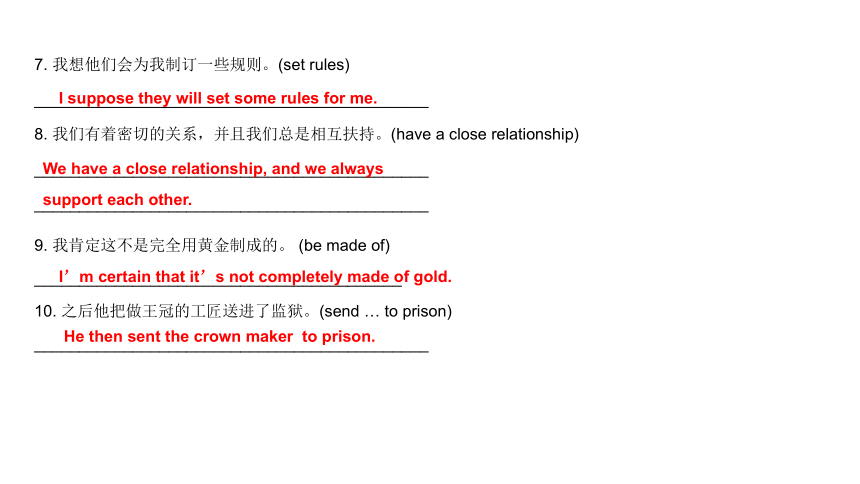
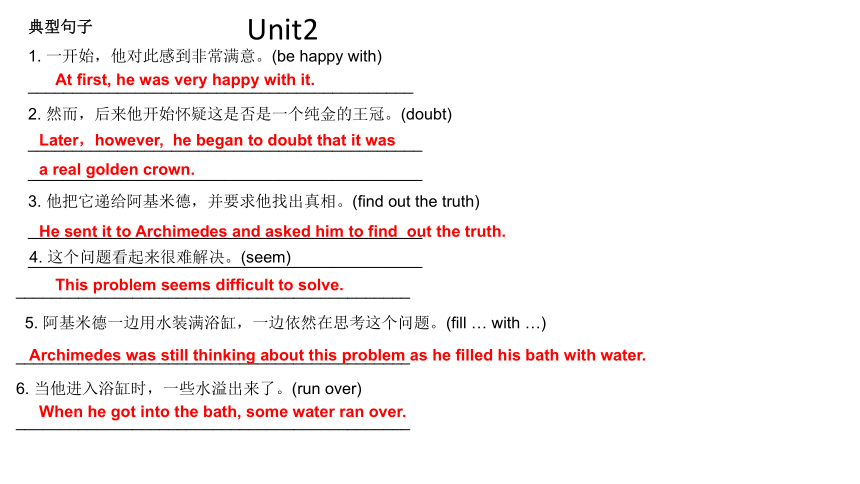
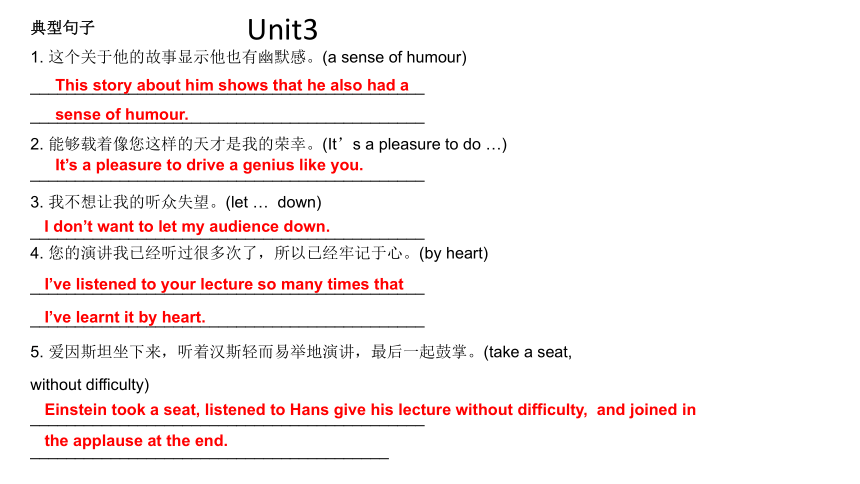
文档简介
(共49张PPT)
Unit1
重要词组:
1.
(对某人或事物)满意的
_________________
2.
用……把……装满
_____________
3.
溢出
____________
4.
把……关进监狱
_________________
5.
确保;设法保证
____________
6.
找出真相
_____________________
7.
把……切成两半
_______________
(be)
happy
with
fill
…
with
…
run
over
send
…
to
prison
make
sure
find
out
the
truth
cut
…
in
half
8.
对……感到惊奇
___________________
9.
考虑
________________
10.加起来;总计
________________
11.引导到
________________
12.下降;下沉
________________
(be)
amazed
at
…
think
about
add
up
lead
…
onto
go
down
Unit2
重要词组:
1.
幽默感
__________________
2.
使……失望
____________
3.
单凭记忆;能背诵
____________
4.
坐下
____________
5.
轻而易举
__________________
6.
参加;加入
____________
7.
丝毫不知道
_______________
sense
of
humour
let
…
down
by
heart
take
a
seat
without
difficulty
join
in
have
no
idea
8.
倒霉;处于困境
__________________
9.
跟某人开玩笑;捉弄某人
__________________
10.
转折点
__________________
11.
一系列__________________
12.
主动做某事
__________________
(be)
in
trouble
play
a
joke
on
sb.
turning
point
a
series
of
offer
to
do
sth.
重要词组:
1.
帮着做
________________
2.
出差
____________________
3.
对……没有兴趣
______________________
4.
有着密切的关系
__________________________
5.
制订规则
________________
6.
有意义;讲得通
________________
7.
过时的
________________
help
with
(be)
on
business
have
no
interest
in
have
a
close
relationship
set
rules
make
sense
out
of
date
Unit3
8.
做出决定
___________________
9.
对……耐心
__________________
10.
除此之外还有
________________
11.
准备好做……
___________________
12.
帮忙
__________________
make
a
decisio
be
patient
with
…
in
addition
be
ready
to
do
…
give
sb.a
hand
重要词组:
1.
节食_____________________
2.
嘲笑;讥笑_____________________
3.
对……感到惭愧_____________________
4.
让某人受不了_____________________
5.
搞得一塌糊涂_____________________
6.
格格不入_____________________
7.
与某人无关__________________________
(be)
on
a
diet
laugh
at
feel
ashamed
of
drive
sb.
mad
make
a
mess
out
of
place
none
of
one’s
business
8.
收到某人的信件(或电子邮件、电话等)___________________
9.
有……的习惯___________________
10.
对……感到担心___________________
11.
下定决心___________________
12.
在意;关注
___________________
hear
from
have
a
habit
of
worry
about
make
up
one’s
mind
pay
attention
to
Unit4
Unit5
重要词组:
1.
楼层平面图
_______________
2.
达人秀
________________
3.
昏迷;失去知觉
______________
4.
保持静止;保持不动(的状态)
____________
5.
紧急出口
________________
6.
在工作日(周一至周五)
_______________
7.
领先
____________
floor
plan
talent
show
ass
out
keep
still
emergency
exit
on
weekdays
ahead
of
8.
剩下五分钟
___________________
9.
举起某人的手
___________________
10.
再多回答六个问题
_________________________
11.
看起来放松
_________________
12.
照射在某人上面______________________
five
minutes
to
go
raise
one’s
hand
answer
six
more
questions
seem
relaxed
shine
down
upon
sb.
Unit6
重要词组:
1.
均衡饮食______________________
2.
乳制品______________________
3.
离开;不接近______________________
4.
油炸食物______________________
5.
软饮料(不含酒精)______________________
6.
体格检查______________________
7.
减肥__________________________
a
balanced
diet
dairy
product
stay
away
from
fried
food
soft
drink
medical
examination
lose
weight
8.
大量;充足_______________________
9.
通常;大体上_______________________
10.
给自己买某物_______________________
11.
愿意做某事_______________________
12.
饮食习惯_______________________
plenty
of
in
general
treat
oneself
to
sth.
(be)
prepared
to
do
sth.
eating
habits
Unit7
重要词组:
1.
休息一下____________________
2.
想像到____________________
3.
出现____________________
4.
真可惜____________________
5.
不停地做____________________
6.
沉默地____________________
7.
过了一会儿____________________
have
a
rest
think
of
come
along
what
a
pity
go
on
doing
in
silence
after
a
while
8.
使翻转_____________________
9.
诱使某人做某事________________________
10.
取笑某人___________________________
11.
警告某人(不)做某事_______________________
12.
从……朝外看_____________________
turn
sth.
over
trick
sb.
into
doing
sth.
laugh
at
/
make
fun
of
sb.
warn
sb.(not)
to
do
sth.
look
out
of
…
Unit8
重要词组:
1.
寻找;寻求____________________
2.
终于;最终____________________
3.
集中(目光、注意力等)于……______________
4.
递出_________________
5.
被控告……;被指责……____________________
6.
用……名字;以……假名____________________
7.
引以为荣
____________________
look
for
at
last
fix
…
on
hold
out
(be)
accused
of
…
under
the
name
(of)
…
(be)
proud
of
8.
一套;一组_________________
9.
上楼
_____________________
10.
脱离危险_____________________
11.
就座_____________________
12.
翻译成……_____________________
a
set
of
go
upstairs
out
of
danger
be
seated
translate
into
…
典型句子
1.
我没有被要求做家务。(be
expected
to
do)
____________________________________________
2.
我父亲经常在国外出差。(on
business)
____________________________________________
3.
但是父母不在家时,我感到孤单。(be
away
from)
____________________________________________
I’m
not
expected
to
do
the
housework.
My
dad
is
often
abroad
on
business.
But
I
feel
lonely
when
my
parents
are
away
from
home.
4.
尽管有时候会觉得我们的小公寓有点拥挤,但我们不介意。(feel
crowded)
____________________________________________
5.
我对时装一类的事物没有兴趣。(have
no
interest
in)
____________________________________________
6.
新的流行款式一下子就过时了,对不对?(out
of
date)
____________________________________________
Although
it
sometimes
feels
crowded
in
our
little
flat,
we
don’t
mind.
I
have
no
interest
in
things
like
fashionable
clothes.
New
fashions
soon
go
out
of
date,
don’t
they?
Unit1
7.
我想他们会为我制订一些规则。(set
rules)
____________________________________________
8.
我们有着密切的关系,并且我们总是相互扶持。(have
a
close
relationship)
____________________________________________
____________________________________________
I
suppose
they
will
set
some
rules
for
me.
We
have
a
close
relationship,
and
we
always
support
each
other.
9.
我肯定这不是完全用黄金制成的。
(be
made
of)
_________________________________________
10.
之后他把做王冠的工匠送进了监狱。(send
…
to
prison)
____________________________________________
I’m
certain
that
it’s
not
completely
made
of
gold.
He
then
sent
the
crown
maker
to
prison.
典型句子
1.
一开始,他对此感到非常满意。(be
happy
with)
___________________________________________
2.
然而,后来他开始怀疑这是否是一个纯金的王冠。(doubt)
____________________________________________
____________________________________________
3.
他把它递给阿基米德,并要求他找出真相。(find
out
the
truth)
____________________________________________
____________________________________________
At
first,
he
was
very
happy
with
it.
Later,however,
he
began
to
doubt
that
it
was
a
real
golden
crown.
He
sent
it
to
Archimedes
and
asked
him
to
find
out
the
truth.
4.
这个问题看起来很难解决。(seem) ____________________________________________
5.
阿基米德一边用水装满浴缸,一边依然在思考这个问题。(fill
…
with
…)
____________________________________________
6.
当他进入浴缸时,一些水溢出来了。(run
over)
____________________________________________
This
problem
seems
difficult
to
solve.
Archimedes
was
still
thinking
about
this
problem
as
he
filled
his
bath
with
water.
When
he
got
into
the
bath,
some
water
ran
over.
Unit2
典型句子
1.
这个关于他的故事显示他也有幽默感。(a
sense
of
humour)
____________________________________________
____________________________________________
2.
能够载着像您这样的天才是我的荣幸。(It’s
a
pleasure
to
do
…)
____________________________________________
3.
我不想让我的听众失望。(let
…
down)
____________________________________________
This
story
about
him
shows
that
he
also
had
a
sense
of
humour.
It’s
a
pleasure
to
drive
a
genius
like
you.
I
don’t
want
to
let
my
audience
down.
4.
您的演讲我已经听过很多次了,所以已经牢记于心。(by
heart) ____________________________________________
____________________________________________
5.
爱因斯坦坐下来,听着汉斯轻而易举地演讲,最后一起鼓掌。(take
a
seat,
without
difficulty)
____________________________________________
________________________________________
I’ve
listened
to
your
lecture
so
many
times
that
I’ve
learnt
it
by
heart.
Einstein
took
a
seat,
listened
to
Hans
give
his
lecture
without
difficulty,
and
joined
in
the
applause
at
the
end.
Unit3
6.
然后他提了一个如此难的问题以至于汉斯丝毫不明白他在说什么。(have
no
idea)
____________________________________________
____________________________________________
7.
现在我们有麻烦了。(in
trouble)
____________________________________________
8.
过了一会儿,汉斯主动提出开车。(offer
to
do
…)
____________________________________________
He
then
asked
a
question
so
difficult
that
Hans
had
no
idea
what
he
was
talking
about.
Now
we’re
in
trouble.
A
little
later,
Hans
offered
to
drive.
典型句子
1.
我担心我的朋友乔琳。
(be
worried
about) ____________________________________________
2.
她总是在节食。(on
a
diet)
____________________________________________
3.
他们太坏了,嘲笑她。(laugh
at)
____________________________________________
4.
我为自己感到羞愧。(feel
ashamed
of)
____________________________________________
I'm
worried
about
my
friend
Jolin.
She's
always
on
a
diet.
It
was
awful
of
them
to
laugh
at
her.
I
feel
ashamed
of
myself.
5.
我不得不与我7岁的妹妹共用一个房间,而她让我受不了。(drive
sb.mad)
____________________________________________
____________________________________________
6.
我努力保持房间整洁,但她却总是搞得一塌糊涂。(make
a
mess)
____________________________________________
I
have
to
share
a
room
with
my
seven-year-old
sister,
and
she's
driving
me
mad!
I
try
to
keep
the
room
tidy,
but
she
always
makes
a
mess.
Unit4
7.
他感觉如此的格格不入!(out
of
place)
____________________________________________
8.
我告诉父母他的行为,但他们说这与我无关。(none
of
one’s
business)
____________________________________________
____________________________________________
He
feels
so
out
of
place!
I
told
my
parents
about
his
behaviour,
but
they
said
it
was
none
of
my
business.
典型句子
1.
我很开心我不是参赛者之一!(be
glad
that,
one
of
the
contestants) ____________________________________________
2.
我想要当一名参赛者。(would
love
to
be) ____________________________________________
3.
突然他们中有一个人晕倒在她的桌子上。(pass
out)
____________________________________________
____________________________________________
I’m
glad
that
I’m
not
one
of
the
contestants!
I’d
love
to
be
a
contestant.
Suddenly
one
of
them
passed
out
and
fell
across
her
desk.
4.
她快速地在安吉拉脸上化妆并且给她梳头发。(brush
one’s
hair)
_____________________________________________
_____________________________________________
5.
该进行旅游知识竞赛了。(It’s
time
for
…)
____________________________________________
She
quickly
put
make?up
on
Angela’s
face
and
brushed
her
hair.
It’s
time
for
Travel
Quiz.
Unit5
6.
她轻松地回答了所有问题并且很快就领先其他两位选手。(with
no
problems,
ahead
of)
____________________________________________
____________________________________________
7.
丹尼斯太兴奋了,以至于她几乎都不能保持平静。(so
…
that
…)
____________________________________________
____________________________________________
She
answered
the
questions
with
no
problems
and
was
soon
ahead
of
the
other
two
contestants.
Denise
was
so
excited
that
she
could
hardly
keep
still.
8.
尽管题目变得越来越难,安吉拉持续答对了这些题。(keep
doing,
get
sth?right)
____________________________________________
____________________________________________
Though
the
questions
were
getting
more
and
more
difficult,
Angela
kept
getting
them
right.
Unit6
典型句子
1.
你觉得怎么样?(How
does
…)
___________________________________________
2.
我已经决定远离油炸食品和软饮料了。(decide
to
do,
stay
away
from) ____________________________________________
____________________________________________
How
does
that
sound
to
you?
I’ve
decided
to
stay
away
from
fried
food
and
soft
drinks.
3.
医生说我需要通过避开吃脂肪、油和糖的方式来减一点肥。(lose
weight)
____________________________________________
____________________________________________
4.
他还说进行更均衡的饮食对于我来说是有必要的。(It’s
necessary
for
sb.
to
do
…)
____________________________________________
____________________________________________
The
doctor
said
that
I
needed
to
lose
a
bit
of
weight
by
avoiding
fat,
oil
and
sugar.
He
also
stated
that
it’s
necessary
for
me
to
have
a
more
balanced
diet.
5.
什么是均衡饮食?(balanced
diet)
_____________________________________________
6.
而且通常来说,你必须少吃乳制品、鸡蛋和肉。(in
general)
____________________________________________
_____________________________________________
What’s
a
balanced
diet?
And,
in
general
you
should
have
fewer
dairy
products
and
eggs,and
less
meat.
7.
然后我给自己买了一些冰淇淋作为点心。(treat
oneself
to
sth.)
____________________________________________
____________________________________________
8.
但是所有这些种类的食物对你都是不健康的。(be
unhealthy
for)
____________________________________________
____________________________________________
Then
I
treated
myself
to
some
ice
cream
for
a
snack.
But
all
of
these
kinds
of
food
are
unhealthy
for
you.
Unit7
典型句子
1.
在星期六的上午,除了汤姆·索亚以外,镇上的每一个男孩都很高兴。(except)
____________________________________________
____________________________________________
2.
它有30码长、3码高。(long;
high)
____________________________________________
On
Saturday
morning,
every
boy
in
town
was
happy,
except
Tom
Sawyer.
It
was
30
yards
long
and
three
yards
high.
3.
他知道那些闲着没事的男孩不久就会过来取笑他。(come
along;
make
fun
of)
____________________________________________
____________________________________________
4.
然后他继续刷漆。(go
on
doing)
____________________________________________
5.
波利婶婶警告我要做好一点。(warn
sb.
to
do
sth.)
_____________________________________________
He
knew
the
boys
who
were
free
would
soon
come
along
and
make
fun
of
him.
Then
he
went
on
painting.
Aunt
Polly
warned
me
to
do
it
well.
6.
我是唯一能把这项工作做对的人。(the
only
person
that
…)
____________________________________________
7.
汤姆把他的刷子给了本,脸带忧愁但心里却乐开了花!(with
…
worry
on)
____________________________________________
____________________________________________
8.
波利婶婶太高兴了,以至于她给了汤姆一个大苹果!(so
pleased
that
…)
____________________________________________
____________________________________________
I’m
the
only
person
that
can
do
it
right.
Tom
gave
Ben
his
brush
with
worry
on
his
face
but
joy
in
his
heart!
Aunt
Polly
was
so
pleased
that
she
gave
Tom
a
big
apple!
Unit8
典型句子
1.
她买不起礼物,于是她坐在地上哭了起来。
(afford)
____________________________________________
____________________________________________
2.
吉姆和黛拉有两件令他们引以为傲的家当。(be
proud
of)
____________________________________________
____________________________________________
She
could
not
afford
a
present,
so
she
sat
down
and
cried.
Jim
and
Della
had
two
possessions
which
they
were
both
proud
of.
3.
然后她走出门,下楼来到街上。(go
out
of)
____________________________________________
____________________________________________
4.
商店门前的标识上写着“发饰品”。(in
front
of)
____________________________________________
5.
他的目光集中在黛拉身上,而且其中有种她读不懂的表情。(fix
on)
_____________________________________________
_____________________________________________
Then
she
went
out
of
the
door
and
down
the
stairs
to
the
street.
The
sign
in
front
of
the
store
read
“Hair
Goods”.
His
eyes
were
fixed
on
Della,
and
there
was
an
expression
in
them
that
she
could
not
read.
6.
现在它们是她的了,但是她的长发却没了。(be
gone)
____________________________________________
7.
我搜遍全镇去找它(这条表链)。(hunt
all
over
…)
____________________________________________
8.
吉姆并没有听她的,而是坐了下来,把他的双手放在脑后,笑了。(put
…
behind
…)
____________________________________________
____________________________________________
Now
they
were
hers,
but
her
hair
was
gone.
I
hunted
all
over
town
to
find
it.
Instead
of
obeying,
Jim
sat
down,
put
his
hands
behind
his
head
and
smiled.
一、根据要求写出相应的单词或短语
1.
gold
______________(adj.)
2.
agree
______________(n.)
3.
sure
______________(同义词)
4.
true
______________(n.)
5.
solve
______________(adv.)
6.
little
______________(比较级)
less
gold
/
golden
agreement
certain
truth
solution
7.
(对某人或事物)满意的
_________________
8.
确保;设法保证
______________
9.
用……把……装满
________________
10.
溢出
______________
11.
把……关进监狱
___________________
12.
命令某人做某事
______________________
(be)
happy
with
make
sure
fill
…
with
…
run
over
send
…
to
prison
order
sb.
to
do
sth
Unit1
一、根据要求写出相应的单词或短语
1.
humorous
____________(n.)
2.
achieve
______________(n.)
3.
please
____________(n.)
4.
exact
____________(adv.)
5.
university
____________(复数形式)
6.
speech
____________(同义词)
humour
achievement
pleasure
exactly
universities
lecture
7.
跟某人开玩笑
___________________
8.
丝毫不知道
________________
9.
处于困境
_______________
10.
轻而易举
___________________
11.
参加;加入
_______________
12.
使……失望
____________
play
a
joke
on
sb.
have
no
idea
(be)in
trouble
without
difficulty
join
in
let
…
down
Unit2
一、根据要求写出相应的单词或短语
1.
decision
____________(v.)
2.
expect
______________(n.)
3.
person
______________(adj.)
4.
fashion
______________(adj.)
5.
invite
______________(n.)
6.
set
____________(过去分词)
decide
expectation
personal
fashionable
invitation
set
7.
出差_____________________
8.
对……没有兴趣_____________________
9.
给某人定规矩_____________________
10.
拥有亲密的关系_________________________
11.
被期待做……
_______________________
12.
过时_____________________
(be)
on
business
have
no
interest
in
set
rules
for
sb.
have
a
close
relationship
be
expected
to
do
…
out
of
date
Unit3
一、根据要求写出相应的单词或短语
1.
suggest
____________(n.)
2.
mess
____________(adj.)
3.
annoying
____________(v.)
4.
fail
____________(n.)
5.
careless
____________(adv.)
6.
polite
____________(adv.)
suggestion
messy
annoy
failure
carelessly
politely
7.
后悔做了某事
__________________
8.
有做某事的习惯
_________________________
9.
对……感到羞愧
_________________
10.
节食
________________
11.
让某人受不了
_______________
12.
收到某人的信件
________________
regret
doing
sth.
have
a
habit
of
doing
sth.
feel
ashamed
of
(be)
on
a
diet
drive
sb.mad
hear
from
sb.
Unit4
一、根据要求写出相应的单词或短语
1.
direct
__________________(n.)
2.
art
____________
(n.)
3.
relax
___________________(adj.)
4.
beat
______________(过去分词)
5.
lucky
_____________(adv.)
6.
survey
_____________(复数形式)
director
/
direction
artist
relaxing
/
relaxed
beaten
luckily
surveys
7.
达人秀
______________
8.
昏迷;失去知觉
______________
9.
保持静止;保持不动(的状态)
____________
10.
在工作日(周一至周五)
_______________
11.
ahead
of
________________
12.
emergency
exit
________________
talent
show
pass
out
keep
still
on
weekdays
在……之前;领先
紧急出口
Unit5
Unit6
一、根据要求写出相应的单词或短语
1.
preference
____________(v.)
2.
medicine
_____________(adj.)
3.state
______________(n.)
4.
necessary
______________(反义词)
5.
treat
_____________(n.)
6.
customer
_____________(复数形式)
prefer
medical
statement
unnecessary
treatment
customers
7.
serve
____________(n.)
8.
a
balanced
diet
____________
9.
medical
examination
____________
10.
减肥
____________
11.
给自己买某物
_____________________
12.
离开;不接近
___________________
service
均衡饮食
体格检查
lose
weight
treat
oneself
to
sth.
stay
away
from
Unit7
一、根据要求写出相应的单词或短语
1.
诱使某人做某事
_______________________
2.
嘲笑某人
___________________
3.
humour
________________(adj.)
4.
work
____________(同义词)
5.
survey
____________
(过去式)
6.
write______________(n.)
trick
sb.into
doing
sth.
laugh
at
sb.
humorous
job
surveyed
writer
7.
出现
________________
8.
famous
______________
(同义词)
9.
沉默地
______________
10.
pretend
______________(过去分词)
come
along
celebrated
in
silence
pretended
Unit8
一、根据要求写出相应的单词或短语
1.
买得起
____________
2.
服从
____________
3.
递出
____________
4.
集中(目光、注意力等)于……
____________
5.
draw
____________(过去式)
6.
graduate
_____________(n.)
afford
obey
hold
out
fix
…
on
drew
graduation
7.
take
pride
in
______________
(同义短语)
8.
gift
____________
(同义词)
9.
wife
____________(复数形式)
10.
America
____________
(adj.)
be
proud
of
present
wives
American
Grammar
反意疑问句
一、反意疑问句的基本用法与结构
反意疑问句由“陈述句+简略疑问句”两部分组成,第一部分提出一种看法,第二部分用来质疑或表示证实。陈述部分与疑问部分的动词时态和动词性质应保持一致,而且肯定和否定形式彼此相反,即:陈述部分为肯定式时,疑问部分用否定式;陈述部分为否定式时,疑问部分用肯定式。如:
He
likes
English,
doesn’t
he?
他喜欢英语,是吗?
He
doesn’t
like
English,
does
he?
他不喜欢英语,是吗?
当反意疑问句的陈述部分带有little,
few,
never,
hardly,
seldom
(很少),
nobody,
nothing等否定意义的词时,
疑问部分用肯定式;
She
said
nothing,
did
she?
她什么也没说,是不是?
It
is
impossible,
isn’t
it?
那是不可能的,对吧?
二、反意疑问句的主语问题
Mary
is
a
nurse,
isn’t
she?
玛丽是护士,对吗?
There
was
nothing
in
the
room,
was
there?
房间里什么也没有,是吗?
That
is
a
new
car,
isn’t
it?
那是一辆新汽车,是吗?
Everyone
is
in
the
classroom,
aren’t
they?
每个人都在教室里,是吗?
He
has
already
left,
hasn’t
he?
他已经离开了,是吗?
He
hasn’t
any
money,
has
he?
=
He
doesn’t
have
any
money,
does
he?
他没有钱,是吗?
Let’s
go
there
together,
shall
we?
我们一起去,好吗?
三、反意疑问句的回答
对反意疑问句的回答,无论问题的提法如何,都要根据事实回答。如果事实是肯定的,就用yes;
如果事实是否定的,就要用no。要特别注意的是,当陈述部分为否定结构、疑问部分用肯定式提问时,
英语回答的yes或no与汉语意思正好相反,即:这种省略回答的yes要译成“不”,no要译成“是”。如:
—He
doesn’t
like
playing
football,
does
he?
他不喜欢踢足球,对不对?
—Yes,
he
does.
/
No,
he
doesn’t.
不,他喜欢。/
是的,他不喜欢。
动词不定式
动词不定式是由“不定式符号to+动词原形”构成的一种非谓语动词结构。
一、动词不定式作定语
动词不定式作定语,一般都是作后置定语,修饰前面的名词或代词。
动词不定式与所修饰词之间的关系:
1.
主谓关系
We
need
some
students
to
help
with
the
work.
我们需要一些学生来帮忙完成这份工作。(students
will
help
with
the
work)
2.
动宾关系
若该不定式为不及物动词,其后须加上适当的介词。
I
have
many
documents
to
type.
我有很多文件要录入。(to
type
many
documents)
3.
同位关系
We
have
made
a
plan
to
learn
from
Lei
Feng.
我们做了个学习雷锋的计划。
4.
状语关系
I
have
no
time
to
go
there.
我没有时间去那里。
二、动词不定式作主语
1.
不定式作主语通常位于句首
To
learn
English
is
very
important
for
everyone
in
modern
society.
在现代社会,学习英语对每个人而言都很重要。
2.
用it作形式主语,而把真正的主语——动词不定式(短语)置于句末
常见句型有:(1)It’s+adj.(+for
sb./sth.)+to
do
sth.
(2)It
is+adj.+of
sb.+to
do
sth?
(3)It
takes
sb.+some
time+to
do
sth.It
is
necessary
for
children
to
have
the
habit
of
reading.
对孩子们而言,养成阅读习惯很有必要。
It
is
friendly
of
you
to
make
me
feel
at
home.
你真友好,让我感觉像在自己家一样。
It
took
us
half
an
hour
to
drive
to
the
countryside.
我们花了半小时开车到乡下。
三、动词不定式作表语
1.
表示目的
The
purpose
of
education
is
to
develop
a
fine
personality
in
children.
教育的目的是发展儿童良好的品格。
系动词
系动词系动词也叫连系动词,其后面通常接名词或形容词等充当表语,构成系表结构,用来说明主语的状况、性质或特征等。
分类
用法
例句
be动词
常用来表示主语的状态,使用时需根据主语的人称和句子的时态做出相应的变化
He
is
a
teacher.
他是一名教师。
She
was
the
last
one
to
arrive.
她是最后一个到达的人。
持续系动词
用来表示主语继续或保持一种状况或态度,主要有keep,
rest,
remain,
stay,
lie,
stand等
He
always
kept
silent.
他(过去)总是保持沉默。
Where
has
the
crown
gone
remains
a
mystery.
皇冠去了哪里仍是一个谜。
表象系动词
用来表示“看起来像”这一概念,主要有seem,
appear,
look等
Your
father
looks
tired.
你爸爸看起来很疲惫。
He
seems
to
be
very
sad.
他看起来很伤心。
感官系动词
主要有feel,
smell,
sound,
taste等
This
kind
of
cloth
feels
very
soft.
这种布手感很软。
This
flower
smells
very
sweet.
这朵花闻起来很香甜。
变化系动词
表示主语变成什么样,主要有become,
grow,
turn,
fall,
get,
go,
run等
The
bread
has
gone
bad.
面包变质了。
She
grew
rich
within
a
short
time.
她没多长时间就变富有了。
终止系动词
表示主语已终止某一动作,主要有prove,
turn
out等,表示“证实;变成”之意
The
search
proved
difficult.
搜查很难。
His
plan
turned
out
a
success.
他的计划终于成功了。
英语句子成分
1.
英语句子的成分一般包括主语、谓语、宾语、定语、补语、状语和表语等七类。
(1)主语:表示句子所要说明或描述的对象。由名词、代词、动名词、动词不定式充当。
He
is
a
student.
他是一名学生。(代词he作主语)
(2)谓语:说明或描述主语的动作、状态或特征。由动词或动词短语充当。
She
loves
cats.
她喜爱猫。(动词love作谓语)
(3)宾语:指谓语动作所涉及的人或物。一般由名词或代词充当。
We
speak
Chinese.
我们讲汉语。(名词Chinese作宾语)
(4)定语:对名词或代词进行修饰、限定或说明。主要由形容词、代词、数词等充当。
I
like
light
music.
我喜欢轻音乐。(形容词light作定语)
(5)补语:主要用于对宾语的补充和说明。一般由名词、动词的非谓语形式、形容词充当。
He
will
buy
me
a
gift.
他将给我买一份礼物。(a
gift作宾语me的补语)
(6)状语:说明事物发生的时间、地点、原因、方式或条件等。一般由副词或状语从句充当。
He
is
watching
TV
at
home.
他正在家里看电视。(at
home作状语,指明动作发生的地点)
(7)表语:说明主语的身份、特征、属性和状态,位于系动词后面。由名词、形容词等充当。
My
father
is
a
writer.
我父亲是一名作家。(a
writer作表语)
2.
基本句型:
宾语从句
一、宾语从句的类型
1.
that引导的宾语从句,
that可省略,常见动词有say,
think,
believe,
tell,
suggest,
know,
hear等。
I
don’t
think
(that)he
will
come
to
my
party.
我认为他不会来我的派对。
The
boy
didn’t
know
(that)his
parents
had
left.
小男孩不知道他的父母已经离开了。
The
teacher
told
us
(that)light
travels
faster
than
sound.
老师告诉我们光比声音传播得更快。
2.
由wh-疑问词引导的宾语从句,常用于动词ask,
wonder,
forget,
know等后面。
I
wonder
where
Susan
will
go
tomorrow.
我想知道苏珊明天会去哪里。
The
boy
asked
his
father
when
it
happened.
那个男孩问他的爸爸它是什么时候发生的。
3.
if和whether
引导的宾语从句,常见动词有ask,
wonder,
forget,
know等,但如果从句后面有or
not时,就只能用whether。
I
don’t
know
whether
/
if
this
bike
is
hers.
我不知道这辆单车是不是她的。
Can
you
tell
me
whether
he
is
a
student
or
not?
你能否告诉我他是不是一名学生?
二、宾语从句的时态
1.
当主句为一般现在时,从句可以用任何时态。
I
hear
that
she
has
written
three
books.
我听说她已经写了三本书。
He
says
that
the
snow
was
very
heavy
yesterday.
他说昨天雪下得很大。
2.
当主句为一般过去时,从句也必须用过去时态中的一种。
We
didn’t
know
why
she
missed
the
flight.
我们不知道她为什么错过了那趟航班。
He
told
me
that
he
was
watching
a
cartoon
film
at
10
o’clock
this
morning.
他告诉我早上十点的时候他在看动画片。
3.
当从句表示客观真理、自然现象等时,谓语动词用一般现在时。
He
said
that
light
travels
much
faster
than
sound.
他说光比声音传播得快得多。
四、宾语从句汇总
语法聚集
定语从句
一、概况
第3课时
Grammar
定语从句
一、概况
1.
考点介绍:关系词的区别运用;关系词使用的特例;定语从句中的谓语动词的数。
2.
关系词的分类及其功能:
如:
I
love
singers
who
write
their
own
songs.
我喜爱那些自己写歌的歌手。(who作主语,表人,可用that代替,不可省略。)
He
is
the
man
(who)I
met
yesterday.
他是我昨天遇到的那位男士。(who作宾语,表人,可用whom或that替换,均可省略。)
The
film
(which)
we
saw
last
night
was
wonderful.
我们昨天晚上看的那部电影很精彩。(which作宾语,表物,可用that替换,均可省略。若作主语则不可省略。)
I
know
the
girl
whose
mother
is
a
teacher.
我认识那个女孩,她的妈妈是一位老师。(whose只能作定语,不可省略,在本句中指人;whose也可指物。)
This
is
the
house
where
my
parents
used
to
live.
这是我父母曾经居住的房子。(where在此作地点状语,不可省略,相当于in
which。)
This
was
the
time
when
he
arrived.
这就是他抵达的时间。(when在此作时间状语,不可省略,相当于at
which。)Nobody
knows
the
reason
why
he
is
often
late
for
school.
没人知道他上学经常迟到的原因。(why在此作原因状语,不可省略,相当于for
which。)
二、关系词只能用that的情况
1.
当先行词被序数词或形容词最高级所修饰,或本身是序数词、基数词、形容词最高级时,只能用that。如:
He
was
the
first
person
that
passed
the
exam.
他是第一个通过考试的人。
2.
当先行词为all,
any,
much,
many,
everything,
anything,
none,
the
one等不定代词时,只能用that。如:
Is
there
anything
that
you
want
to
buy
in
the
shop?你有什么东西要在商店里买吗?
3.
当先行词被the
only,
the
very,
the
same,
the
last,
little,
few
等词修饰时,只能用that。如:
This
is
the
same
bike
that
I
lost.
这就是我丢失的那辆自行车。
4.
当先行词里同时含有人和物时,只能用that。如:
I
can
remember
well
the
persons
and
some
pictures
that
I
saw
in
the
room.
我能清楚记得我在那个房间所见到的人和一些照片。
5.
由who或which引导的特殊疑问句,为避免重复,只能用that。如:
Who
is
the
girl
that
is
crying?
正在哭泣的那个女孩是谁?
6.
主句是there
be
结构,先行词为物,修饰主语的定语从句的关系词只能用that。如:
There
is
a
book
on
the
desk
that
belongs
to
Tom.
书桌上有本属于汤姆的书。
注意:(1)在有些情况下,关系词只能用which而不宜用that,如:先行词为that;关系代词前有介词时,一般用which;引导非限制性定语从句只能用which。由于篇幅所限,在此不一一举例赘述。
(2)关系词在定语从句中作主语时,从句中的谓语动词的单复数形式要与先行词保持一致。如:
I
prefer
shoes
that
are
cool.
我更喜欢那些样式酷的鞋子。(shoes为复数形式,故从句be动词用are。)
I
have
a
friend
who
likes
doing
sports.
我有一个热爱运动的朋友。(a
friend为单数形式,故从句谓语动词用likes。)
三、定语从句汇总
语法聚集
介词短语
第3课时
Grammar
语法
介词的用法
使用
原则
介词是起“中介”作用的词,当某个词不能直接连接其他词时,就需要介词来帮忙,所以它的搭配能力特别强,是英语中最活跃的词之一。介词可以放在形容词、名词、动词后面,构成不同的搭配或短语
形容词与介词的常用搭配
of:
nice
/
kind
/
silly
…
of
sb?;
afraid
/
tired
…
of
sb./
sth.
to:
nice
/
kind
/
good
/
(im)polite
/
rude
/
(un)friendly
/
cruel
…
to
sb.
about:
angry
/
sorry
/
crazy
/
certain
/
worried
/
excited
…
about
sth.
with:
angry
/
strict
…
with
sb?;
happy
/
pleased
/
satisfied
/
bored
…
with
sth.
at:
good
/
bad
/
excellent
…
at
(doing)
sth.
in:
interested
/
successful
…
in
(doing)
sth.
名词与介词的常用搭配
for:
need
/
reason
/
responsibility
/
advertisement
/
trouble
…
for
…
in:
differences
/
course
/
difficulty
…
in
…
of:
cause
/
way
/
address
/
experience
/
member
/
method
/
idea
…
of
…
on
/
about:
information
/
advice
/
decision
…
on
/
about
…
动词与介词的常用搭配
about:
care
/
complain
/
talk
/
think
/
worry
/
learn
…
about
…
after:
look
/
take
…
after
…
at:
laugh
/
look
/
arrive
…
at
…
for:
apologize
/
stand
/
look
/
pay
/
wait
/
prepare
…
for
…
in:
believe
/
result
/
succeed
…
in
…
Unit1
重要词组:
1.
(对某人或事物)满意的
_________________
2.
用……把……装满
_____________
3.
溢出
____________
4.
把……关进监狱
_________________
5.
确保;设法保证
____________
6.
找出真相
_____________________
7.
把……切成两半
_______________
(be)
happy
with
fill
…
with
…
run
over
send
…
to
prison
make
sure
find
out
the
truth
cut
…
in
half
8.
对……感到惊奇
___________________
9.
考虑
________________
10.加起来;总计
________________
11.引导到
________________
12.下降;下沉
________________
(be)
amazed
at
…
think
about
add
up
lead
…
onto
go
down
Unit2
重要词组:
1.
幽默感
__________________
2.
使……失望
____________
3.
单凭记忆;能背诵
____________
4.
坐下
____________
5.
轻而易举
__________________
6.
参加;加入
____________
7.
丝毫不知道
_______________
sense
of
humour
let
…
down
by
heart
take
a
seat
without
difficulty
join
in
have
no
idea
8.
倒霉;处于困境
__________________
9.
跟某人开玩笑;捉弄某人
__________________
10.
转折点
__________________
11.
一系列__________________
12.
主动做某事
__________________
(be)
in
trouble
play
a
joke
on
sb.
turning
point
a
series
of
offer
to
do
sth.
重要词组:
1.
帮着做
________________
2.
出差
____________________
3.
对……没有兴趣
______________________
4.
有着密切的关系
__________________________
5.
制订规则
________________
6.
有意义;讲得通
________________
7.
过时的
________________
help
with
(be)
on
business
have
no
interest
in
have
a
close
relationship
set
rules
make
sense
out
of
date
Unit3
8.
做出决定
___________________
9.
对……耐心
__________________
10.
除此之外还有
________________
11.
准备好做……
___________________
12.
帮忙
__________________
make
a
decisio
be
patient
with
…
in
addition
be
ready
to
do
…
give
sb.a
hand
重要词组:
1.
节食_____________________
2.
嘲笑;讥笑_____________________
3.
对……感到惭愧_____________________
4.
让某人受不了_____________________
5.
搞得一塌糊涂_____________________
6.
格格不入_____________________
7.
与某人无关__________________________
(be)
on
a
diet
laugh
at
feel
ashamed
of
drive
sb.
mad
make
a
mess
out
of
place
none
of
one’s
business
8.
收到某人的信件(或电子邮件、电话等)___________________
9.
有……的习惯___________________
10.
对……感到担心___________________
11.
下定决心___________________
12.
在意;关注
___________________
hear
from
have
a
habit
of
worry
about
make
up
one’s
mind
pay
attention
to
Unit4
Unit5
重要词组:
1.
楼层平面图
_______________
2.
达人秀
________________
3.
昏迷;失去知觉
______________
4.
保持静止;保持不动(的状态)
____________
5.
紧急出口
________________
6.
在工作日(周一至周五)
_______________
7.
领先
____________
floor
plan
talent
show
ass
out
keep
still
emergency
exit
on
weekdays
ahead
of
8.
剩下五分钟
___________________
9.
举起某人的手
___________________
10.
再多回答六个问题
_________________________
11.
看起来放松
_________________
12.
照射在某人上面______________________
five
minutes
to
go
raise
one’s
hand
answer
six
more
questions
seem
relaxed
shine
down
upon
sb.
Unit6
重要词组:
1.
均衡饮食______________________
2.
乳制品______________________
3.
离开;不接近______________________
4.
油炸食物______________________
5.
软饮料(不含酒精)______________________
6.
体格检查______________________
7.
减肥__________________________
a
balanced
diet
dairy
product
stay
away
from
fried
food
soft
drink
medical
examination
lose
weight
8.
大量;充足_______________________
9.
通常;大体上_______________________
10.
给自己买某物_______________________
11.
愿意做某事_______________________
12.
饮食习惯_______________________
plenty
of
in
general
treat
oneself
to
sth.
(be)
prepared
to
do
sth.
eating
habits
Unit7
重要词组:
1.
休息一下____________________
2.
想像到____________________
3.
出现____________________
4.
真可惜____________________
5.
不停地做____________________
6.
沉默地____________________
7.
过了一会儿____________________
have
a
rest
think
of
come
along
what
a
pity
go
on
doing
in
silence
after
a
while
8.
使翻转_____________________
9.
诱使某人做某事________________________
10.
取笑某人___________________________
11.
警告某人(不)做某事_______________________
12.
从……朝外看_____________________
turn
sth.
over
trick
sb.
into
doing
sth.
laugh
at
/
make
fun
of
sb.
warn
sb.(not)
to
do
sth.
look
out
of
…
Unit8
重要词组:
1.
寻找;寻求____________________
2.
终于;最终____________________
3.
集中(目光、注意力等)于……______________
4.
递出_________________
5.
被控告……;被指责……____________________
6.
用……名字;以……假名____________________
7.
引以为荣
____________________
look
for
at
last
fix
…
on
hold
out
(be)
accused
of
…
under
the
name
(of)
…
(be)
proud
of
8.
一套;一组_________________
9.
上楼
_____________________
10.
脱离危险_____________________
11.
就座_____________________
12.
翻译成……_____________________
a
set
of
go
upstairs
out
of
danger
be
seated
translate
into
…
典型句子
1.
我没有被要求做家务。(be
expected
to
do)
____________________________________________
2.
我父亲经常在国外出差。(on
business)
____________________________________________
3.
但是父母不在家时,我感到孤单。(be
away
from)
____________________________________________
I’m
not
expected
to
do
the
housework.
My
dad
is
often
abroad
on
business.
But
I
feel
lonely
when
my
parents
are
away
from
home.
4.
尽管有时候会觉得我们的小公寓有点拥挤,但我们不介意。(feel
crowded)
____________________________________________
5.
我对时装一类的事物没有兴趣。(have
no
interest
in)
____________________________________________
6.
新的流行款式一下子就过时了,对不对?(out
of
date)
____________________________________________
Although
it
sometimes
feels
crowded
in
our
little
flat,
we
don’t
mind.
I
have
no
interest
in
things
like
fashionable
clothes.
New
fashions
soon
go
out
of
date,
don’t
they?
Unit1
7.
我想他们会为我制订一些规则。(set
rules)
____________________________________________
8.
我们有着密切的关系,并且我们总是相互扶持。(have
a
close
relationship)
____________________________________________
____________________________________________
I
suppose
they
will
set
some
rules
for
me.
We
have
a
close
relationship,
and
we
always
support
each
other.
9.
我肯定这不是完全用黄金制成的。
(be
made
of)
_________________________________________
10.
之后他把做王冠的工匠送进了监狱。(send
…
to
prison)
____________________________________________
I’m
certain
that
it’s
not
completely
made
of
gold.
He
then
sent
the
crown
maker
to
prison.
典型句子
1.
一开始,他对此感到非常满意。(be
happy
with)
___________________________________________
2.
然而,后来他开始怀疑这是否是一个纯金的王冠。(doubt)
____________________________________________
____________________________________________
3.
他把它递给阿基米德,并要求他找出真相。(find
out
the
truth)
____________________________________________
____________________________________________
At
first,
he
was
very
happy
with
it.
Later,however,
he
began
to
doubt
that
it
was
a
real
golden
crown.
He
sent
it
to
Archimedes
and
asked
him
to
find
out
the
truth.
4.
这个问题看起来很难解决。(seem) ____________________________________________
5.
阿基米德一边用水装满浴缸,一边依然在思考这个问题。(fill
…
with
…)
____________________________________________
6.
当他进入浴缸时,一些水溢出来了。(run
over)
____________________________________________
This
problem
seems
difficult
to
solve.
Archimedes
was
still
thinking
about
this
problem
as
he
filled
his
bath
with
water.
When
he
got
into
the
bath,
some
water
ran
over.
Unit2
典型句子
1.
这个关于他的故事显示他也有幽默感。(a
sense
of
humour)
____________________________________________
____________________________________________
2.
能够载着像您这样的天才是我的荣幸。(It’s
a
pleasure
to
do
…)
____________________________________________
3.
我不想让我的听众失望。(let
…
down)
____________________________________________
This
story
about
him
shows
that
he
also
had
a
sense
of
humour.
It’s
a
pleasure
to
drive
a
genius
like
you.
I
don’t
want
to
let
my
audience
down.
4.
您的演讲我已经听过很多次了,所以已经牢记于心。(by
heart) ____________________________________________
____________________________________________
5.
爱因斯坦坐下来,听着汉斯轻而易举地演讲,最后一起鼓掌。(take
a
seat,
without
difficulty)
____________________________________________
________________________________________
I’ve
listened
to
your
lecture
so
many
times
that
I’ve
learnt
it
by
heart.
Einstein
took
a
seat,
listened
to
Hans
give
his
lecture
without
difficulty,
and
joined
in
the
applause
at
the
end.
Unit3
6.
然后他提了一个如此难的问题以至于汉斯丝毫不明白他在说什么。(have
no
idea)
____________________________________________
____________________________________________
7.
现在我们有麻烦了。(in
trouble)
____________________________________________
8.
过了一会儿,汉斯主动提出开车。(offer
to
do
…)
____________________________________________
He
then
asked
a
question
so
difficult
that
Hans
had
no
idea
what
he
was
talking
about.
Now
we’re
in
trouble.
A
little
later,
Hans
offered
to
drive.
典型句子
1.
我担心我的朋友乔琳。
(be
worried
about) ____________________________________________
2.
她总是在节食。(on
a
diet)
____________________________________________
3.
他们太坏了,嘲笑她。(laugh
at)
____________________________________________
4.
我为自己感到羞愧。(feel
ashamed
of)
____________________________________________
I'm
worried
about
my
friend
Jolin.
She's
always
on
a
diet.
It
was
awful
of
them
to
laugh
at
her.
I
feel
ashamed
of
myself.
5.
我不得不与我7岁的妹妹共用一个房间,而她让我受不了。(drive
sb.mad)
____________________________________________
____________________________________________
6.
我努力保持房间整洁,但她却总是搞得一塌糊涂。(make
a
mess)
____________________________________________
I
have
to
share
a
room
with
my
seven-year-old
sister,
and
she's
driving
me
mad!
I
try
to
keep
the
room
tidy,
but
she
always
makes
a
mess.
Unit4
7.
他感觉如此的格格不入!(out
of
place)
____________________________________________
8.
我告诉父母他的行为,但他们说这与我无关。(none
of
one’s
business)
____________________________________________
____________________________________________
He
feels
so
out
of
place!
I
told
my
parents
about
his
behaviour,
but
they
said
it
was
none
of
my
business.
典型句子
1.
我很开心我不是参赛者之一!(be
glad
that,
one
of
the
contestants) ____________________________________________
2.
我想要当一名参赛者。(would
love
to
be) ____________________________________________
3.
突然他们中有一个人晕倒在她的桌子上。(pass
out)
____________________________________________
____________________________________________
I’m
glad
that
I’m
not
one
of
the
contestants!
I’d
love
to
be
a
contestant.
Suddenly
one
of
them
passed
out
and
fell
across
her
desk.
4.
她快速地在安吉拉脸上化妆并且给她梳头发。(brush
one’s
hair)
_____________________________________________
_____________________________________________
5.
该进行旅游知识竞赛了。(It’s
time
for
…)
____________________________________________
She
quickly
put
make?up
on
Angela’s
face
and
brushed
her
hair.
It’s
time
for
Travel
Quiz.
Unit5
6.
她轻松地回答了所有问题并且很快就领先其他两位选手。(with
no
problems,
ahead
of)
____________________________________________
____________________________________________
7.
丹尼斯太兴奋了,以至于她几乎都不能保持平静。(so
…
that
…)
____________________________________________
____________________________________________
She
answered
the
questions
with
no
problems
and
was
soon
ahead
of
the
other
two
contestants.
Denise
was
so
excited
that
she
could
hardly
keep
still.
8.
尽管题目变得越来越难,安吉拉持续答对了这些题。(keep
doing,
get
sth?right)
____________________________________________
____________________________________________
Though
the
questions
were
getting
more
and
more
difficult,
Angela
kept
getting
them
right.
Unit6
典型句子
1.
你觉得怎么样?(How
does
…)
___________________________________________
2.
我已经决定远离油炸食品和软饮料了。(decide
to
do,
stay
away
from) ____________________________________________
____________________________________________
How
does
that
sound
to
you?
I’ve
decided
to
stay
away
from
fried
food
and
soft
drinks.
3.
医生说我需要通过避开吃脂肪、油和糖的方式来减一点肥。(lose
weight)
____________________________________________
____________________________________________
4.
他还说进行更均衡的饮食对于我来说是有必要的。(It’s
necessary
for
sb.
to
do
…)
____________________________________________
____________________________________________
The
doctor
said
that
I
needed
to
lose
a
bit
of
weight
by
avoiding
fat,
oil
and
sugar.
He
also
stated
that
it’s
necessary
for
me
to
have
a
more
balanced
diet.
5.
什么是均衡饮食?(balanced
diet)
_____________________________________________
6.
而且通常来说,你必须少吃乳制品、鸡蛋和肉。(in
general)
____________________________________________
_____________________________________________
What’s
a
balanced
diet?
And,
in
general
you
should
have
fewer
dairy
products
and
eggs,and
less
meat.
7.
然后我给自己买了一些冰淇淋作为点心。(treat
oneself
to
sth.)
____________________________________________
____________________________________________
8.
但是所有这些种类的食物对你都是不健康的。(be
unhealthy
for)
____________________________________________
____________________________________________
Then
I
treated
myself
to
some
ice
cream
for
a
snack.
But
all
of
these
kinds
of
food
are
unhealthy
for
you.
Unit7
典型句子
1.
在星期六的上午,除了汤姆·索亚以外,镇上的每一个男孩都很高兴。(except)
____________________________________________
____________________________________________
2.
它有30码长、3码高。(long;
high)
____________________________________________
On
Saturday
morning,
every
boy
in
town
was
happy,
except
Tom
Sawyer.
It
was
30
yards
long
and
three
yards
high.
3.
他知道那些闲着没事的男孩不久就会过来取笑他。(come
along;
make
fun
of)
____________________________________________
____________________________________________
4.
然后他继续刷漆。(go
on
doing)
____________________________________________
5.
波利婶婶警告我要做好一点。(warn
sb.
to
do
sth.)
_____________________________________________
He
knew
the
boys
who
were
free
would
soon
come
along
and
make
fun
of
him.
Then
he
went
on
painting.
Aunt
Polly
warned
me
to
do
it
well.
6.
我是唯一能把这项工作做对的人。(the
only
person
that
…)
____________________________________________
7.
汤姆把他的刷子给了本,脸带忧愁但心里却乐开了花!(with
…
worry
on)
____________________________________________
____________________________________________
8.
波利婶婶太高兴了,以至于她给了汤姆一个大苹果!(so
pleased
that
…)
____________________________________________
____________________________________________
I’m
the
only
person
that
can
do
it
right.
Tom
gave
Ben
his
brush
with
worry
on
his
face
but
joy
in
his
heart!
Aunt
Polly
was
so
pleased
that
she
gave
Tom
a
big
apple!
Unit8
典型句子
1.
她买不起礼物,于是她坐在地上哭了起来。
(afford)
____________________________________________
____________________________________________
2.
吉姆和黛拉有两件令他们引以为傲的家当。(be
proud
of)
____________________________________________
____________________________________________
She
could
not
afford
a
present,
so
she
sat
down
and
cried.
Jim
and
Della
had
two
possessions
which
they
were
both
proud
of.
3.
然后她走出门,下楼来到街上。(go
out
of)
____________________________________________
____________________________________________
4.
商店门前的标识上写着“发饰品”。(in
front
of)
____________________________________________
5.
他的目光集中在黛拉身上,而且其中有种她读不懂的表情。(fix
on)
_____________________________________________
_____________________________________________
Then
she
went
out
of
the
door
and
down
the
stairs
to
the
street.
The
sign
in
front
of
the
store
read
“Hair
Goods”.
His
eyes
were
fixed
on
Della,
and
there
was
an
expression
in
them
that
she
could
not
read.
6.
现在它们是她的了,但是她的长发却没了。(be
gone)
____________________________________________
7.
我搜遍全镇去找它(这条表链)。(hunt
all
over
…)
____________________________________________
8.
吉姆并没有听她的,而是坐了下来,把他的双手放在脑后,笑了。(put
…
behind
…)
____________________________________________
____________________________________________
Now
they
were
hers,
but
her
hair
was
gone.
I
hunted
all
over
town
to
find
it.
Instead
of
obeying,
Jim
sat
down,
put
his
hands
behind
his
head
and
smiled.
一、根据要求写出相应的单词或短语
1.
gold
______________(adj.)
2.
agree
______________(n.)
3.
sure
______________(同义词)
4.
true
______________(n.)
5.
solve
______________(adv.)
6.
little
______________(比较级)
less
gold
/
golden
agreement
certain
truth
solution
7.
(对某人或事物)满意的
_________________
8.
确保;设法保证
______________
9.
用……把……装满
________________
10.
溢出
______________
11.
把……关进监狱
___________________
12.
命令某人做某事
______________________
(be)
happy
with
make
sure
fill
…
with
…
run
over
send
…
to
prison
order
sb.
to
do
sth
Unit1
一、根据要求写出相应的单词或短语
1.
humorous
____________(n.)
2.
achieve
______________(n.)
3.
please
____________(n.)
4.
exact
____________(adv.)
5.
university
____________(复数形式)
6.
speech
____________(同义词)
humour
achievement
pleasure
exactly
universities
lecture
7.
跟某人开玩笑
___________________
8.
丝毫不知道
________________
9.
处于困境
_______________
10.
轻而易举
___________________
11.
参加;加入
_______________
12.
使……失望
____________
play
a
joke
on
sb.
have
no
idea
(be)in
trouble
without
difficulty
join
in
let
…
down
Unit2
一、根据要求写出相应的单词或短语
1.
decision
____________(v.)
2.
expect
______________(n.)
3.
person
______________(adj.)
4.
fashion
______________(adj.)
5.
invite
______________(n.)
6.
set
____________(过去分词)
decide
expectation
personal
fashionable
invitation
set
7.
出差_____________________
8.
对……没有兴趣_____________________
9.
给某人定规矩_____________________
10.
拥有亲密的关系_________________________
11.
被期待做……
_______________________
12.
过时_____________________
(be)
on
business
have
no
interest
in
set
rules
for
sb.
have
a
close
relationship
be
expected
to
do
…
out
of
date
Unit3
一、根据要求写出相应的单词或短语
1.
suggest
____________(n.)
2.
mess
____________(adj.)
3.
annoying
____________(v.)
4.
fail
____________(n.)
5.
careless
____________(adv.)
6.
polite
____________(adv.)
suggestion
messy
annoy
failure
carelessly
politely
7.
后悔做了某事
__________________
8.
有做某事的习惯
_________________________
9.
对……感到羞愧
_________________
10.
节食
________________
11.
让某人受不了
_______________
12.
收到某人的信件
________________
regret
doing
sth.
have
a
habit
of
doing
sth.
feel
ashamed
of
(be)
on
a
diet
drive
sb.mad
hear
from
sb.
Unit4
一、根据要求写出相应的单词或短语
1.
direct
__________________(n.)
2.
art
____________
(n.)
3.
relax
___________________(adj.)
4.
beat
______________(过去分词)
5.
lucky
_____________(adv.)
6.
survey
_____________(复数形式)
director
/
direction
artist
relaxing
/
relaxed
beaten
luckily
surveys
7.
达人秀
______________
8.
昏迷;失去知觉
______________
9.
保持静止;保持不动(的状态)
____________
10.
在工作日(周一至周五)
_______________
11.
ahead
of
________________
12.
emergency
exit
________________
talent
show
pass
out
keep
still
on
weekdays
在……之前;领先
紧急出口
Unit5
Unit6
一、根据要求写出相应的单词或短语
1.
preference
____________(v.)
2.
medicine
_____________(adj.)
3.state
______________(n.)
4.
necessary
______________(反义词)
5.
treat
_____________(n.)
6.
customer
_____________(复数形式)
prefer
medical
statement
unnecessary
treatment
customers
7.
serve
____________(n.)
8.
a
balanced
diet
____________
9.
medical
examination
____________
10.
减肥
____________
11.
给自己买某物
_____________________
12.
离开;不接近
___________________
service
均衡饮食
体格检查
lose
weight
treat
oneself
to
sth.
stay
away
from
Unit7
一、根据要求写出相应的单词或短语
1.
诱使某人做某事
_______________________
2.
嘲笑某人
___________________
3.
humour
________________(adj.)
4.
work
____________(同义词)
5.
survey
____________
(过去式)
6.
write______________(n.)
trick
sb.into
doing
sth.
laugh
at
sb.
humorous
job
surveyed
writer
7.
出现
________________
8.
famous
______________
(同义词)
9.
沉默地
______________
10.
pretend
______________(过去分词)
come
along
celebrated
in
silence
pretended
Unit8
一、根据要求写出相应的单词或短语
1.
买得起
____________
2.
服从
____________
3.
递出
____________
4.
集中(目光、注意力等)于……
____________
5.
draw
____________(过去式)
6.
graduate
_____________(n.)
afford
obey
hold
out
fix
…
on
drew
graduation
7.
take
pride
in
______________
(同义短语)
8.
gift
____________
(同义词)
9.
wife
____________(复数形式)
10.
America
____________
(adj.)
be
proud
of
present
wives
American
Grammar
反意疑问句
一、反意疑问句的基本用法与结构
反意疑问句由“陈述句+简略疑问句”两部分组成,第一部分提出一种看法,第二部分用来质疑或表示证实。陈述部分与疑问部分的动词时态和动词性质应保持一致,而且肯定和否定形式彼此相反,即:陈述部分为肯定式时,疑问部分用否定式;陈述部分为否定式时,疑问部分用肯定式。如:
He
likes
English,
doesn’t
he?
他喜欢英语,是吗?
He
doesn’t
like
English,
does
he?
他不喜欢英语,是吗?
当反意疑问句的陈述部分带有little,
few,
never,
hardly,
seldom
(很少),
nobody,
nothing等否定意义的词时,
疑问部分用肯定式;
She
said
nothing,
did
she?
她什么也没说,是不是?
It
is
impossible,
isn’t
it?
那是不可能的,对吧?
二、反意疑问句的主语问题
Mary
is
a
nurse,
isn’t
she?
玛丽是护士,对吗?
There
was
nothing
in
the
room,
was
there?
房间里什么也没有,是吗?
That
is
a
new
car,
isn’t
it?
那是一辆新汽车,是吗?
Everyone
is
in
the
classroom,
aren’t
they?
每个人都在教室里,是吗?
He
has
already
left,
hasn’t
he?
他已经离开了,是吗?
He
hasn’t
any
money,
has
he?
=
He
doesn’t
have
any
money,
does
he?
他没有钱,是吗?
Let’s
go
there
together,
shall
we?
我们一起去,好吗?
三、反意疑问句的回答
对反意疑问句的回答,无论问题的提法如何,都要根据事实回答。如果事实是肯定的,就用yes;
如果事实是否定的,就要用no。要特别注意的是,当陈述部分为否定结构、疑问部分用肯定式提问时,
英语回答的yes或no与汉语意思正好相反,即:这种省略回答的yes要译成“不”,no要译成“是”。如:
—He
doesn’t
like
playing
football,
does
he?
他不喜欢踢足球,对不对?
—Yes,
he
does.
/
No,
he
doesn’t.
不,他喜欢。/
是的,他不喜欢。
动词不定式
动词不定式是由“不定式符号to+动词原形”构成的一种非谓语动词结构。
一、动词不定式作定语
动词不定式作定语,一般都是作后置定语,修饰前面的名词或代词。
动词不定式与所修饰词之间的关系:
1.
主谓关系
We
need
some
students
to
help
with
the
work.
我们需要一些学生来帮忙完成这份工作。(students
will
help
with
the
work)
2.
动宾关系
若该不定式为不及物动词,其后须加上适当的介词。
I
have
many
documents
to
type.
我有很多文件要录入。(to
type
many
documents)
3.
同位关系
We
have
made
a
plan
to
learn
from
Lei
Feng.
我们做了个学习雷锋的计划。
4.
状语关系
I
have
no
time
to
go
there.
我没有时间去那里。
二、动词不定式作主语
1.
不定式作主语通常位于句首
To
learn
English
is
very
important
for
everyone
in
modern
society.
在现代社会,学习英语对每个人而言都很重要。
2.
用it作形式主语,而把真正的主语——动词不定式(短语)置于句末
常见句型有:(1)It’s+adj.(+for
sb./sth.)+to
do
sth.
(2)It
is+adj.+of
sb.+to
do
sth?
(3)It
takes
sb.+some
time+to
do
sth.It
is
necessary
for
children
to
have
the
habit
of
reading.
对孩子们而言,养成阅读习惯很有必要。
It
is
friendly
of
you
to
make
me
feel
at
home.
你真友好,让我感觉像在自己家一样。
It
took
us
half
an
hour
to
drive
to
the
countryside.
我们花了半小时开车到乡下。
三、动词不定式作表语
1.
表示目的
The
purpose
of
education
is
to
develop
a
fine
personality
in
children.
教育的目的是发展儿童良好的品格。
系动词
系动词系动词也叫连系动词,其后面通常接名词或形容词等充当表语,构成系表结构,用来说明主语的状况、性质或特征等。
分类
用法
例句
be动词
常用来表示主语的状态,使用时需根据主语的人称和句子的时态做出相应的变化
He
is
a
teacher.
他是一名教师。
She
was
the
last
one
to
arrive.
她是最后一个到达的人。
持续系动词
用来表示主语继续或保持一种状况或态度,主要有keep,
rest,
remain,
stay,
lie,
stand等
He
always
kept
silent.
他(过去)总是保持沉默。
Where
has
the
crown
gone
remains
a
mystery.
皇冠去了哪里仍是一个谜。
表象系动词
用来表示“看起来像”这一概念,主要有seem,
appear,
look等
Your
father
looks
tired.
你爸爸看起来很疲惫。
He
seems
to
be
very
sad.
他看起来很伤心。
感官系动词
主要有feel,
smell,
sound,
taste等
This
kind
of
cloth
feels
very
soft.
这种布手感很软。
This
flower
smells
very
sweet.
这朵花闻起来很香甜。
变化系动词
表示主语变成什么样,主要有become,
grow,
turn,
fall,
get,
go,
run等
The
bread
has
gone
bad.
面包变质了。
She
grew
rich
within
a
short
time.
她没多长时间就变富有了。
终止系动词
表示主语已终止某一动作,主要有prove,
turn
out等,表示“证实;变成”之意
The
search
proved
difficult.
搜查很难。
His
plan
turned
out
a
success.
他的计划终于成功了。
英语句子成分
1.
英语句子的成分一般包括主语、谓语、宾语、定语、补语、状语和表语等七类。
(1)主语:表示句子所要说明或描述的对象。由名词、代词、动名词、动词不定式充当。
He
is
a
student.
他是一名学生。(代词he作主语)
(2)谓语:说明或描述主语的动作、状态或特征。由动词或动词短语充当。
She
loves
cats.
她喜爱猫。(动词love作谓语)
(3)宾语:指谓语动作所涉及的人或物。一般由名词或代词充当。
We
speak
Chinese.
我们讲汉语。(名词Chinese作宾语)
(4)定语:对名词或代词进行修饰、限定或说明。主要由形容词、代词、数词等充当。
I
like
light
music.
我喜欢轻音乐。(形容词light作定语)
(5)补语:主要用于对宾语的补充和说明。一般由名词、动词的非谓语形式、形容词充当。
He
will
buy
me
a
gift.
他将给我买一份礼物。(a
gift作宾语me的补语)
(6)状语:说明事物发生的时间、地点、原因、方式或条件等。一般由副词或状语从句充当。
He
is
watching
TV
at
home.
他正在家里看电视。(at
home作状语,指明动作发生的地点)
(7)表语:说明主语的身份、特征、属性和状态,位于系动词后面。由名词、形容词等充当。
My
father
is
a
writer.
我父亲是一名作家。(a
writer作表语)
2.
基本句型:
宾语从句
一、宾语从句的类型
1.
that引导的宾语从句,
that可省略,常见动词有say,
think,
believe,
tell,
suggest,
know,
hear等。
I
don’t
think
(that)he
will
come
to
my
party.
我认为他不会来我的派对。
The
boy
didn’t
know
(that)his
parents
had
left.
小男孩不知道他的父母已经离开了。
The
teacher
told
us
(that)light
travels
faster
than
sound.
老师告诉我们光比声音传播得更快。
2.
由wh-疑问词引导的宾语从句,常用于动词ask,
wonder,
forget,
know等后面。
I
wonder
where
Susan
will
go
tomorrow.
我想知道苏珊明天会去哪里。
The
boy
asked
his
father
when
it
happened.
那个男孩问他的爸爸它是什么时候发生的。
3.
if和whether
引导的宾语从句,常见动词有ask,
wonder,
forget,
know等,但如果从句后面有or
not时,就只能用whether。
I
don’t
know
whether
/
if
this
bike
is
hers.
我不知道这辆单车是不是她的。
Can
you
tell
me
whether
he
is
a
student
or
not?
你能否告诉我他是不是一名学生?
二、宾语从句的时态
1.
当主句为一般现在时,从句可以用任何时态。
I
hear
that
she
has
written
three
books.
我听说她已经写了三本书。
He
says
that
the
snow
was
very
heavy
yesterday.
他说昨天雪下得很大。
2.
当主句为一般过去时,从句也必须用过去时态中的一种。
We
didn’t
know
why
she
missed
the
flight.
我们不知道她为什么错过了那趟航班。
He
told
me
that
he
was
watching
a
cartoon
film
at
10
o’clock
this
morning.
他告诉我早上十点的时候他在看动画片。
3.
当从句表示客观真理、自然现象等时,谓语动词用一般现在时。
He
said
that
light
travels
much
faster
than
sound.
他说光比声音传播得快得多。
四、宾语从句汇总
语法聚集
定语从句
一、概况
第3课时
Grammar
定语从句
一、概况
1.
考点介绍:关系词的区别运用;关系词使用的特例;定语从句中的谓语动词的数。
2.
关系词的分类及其功能:
如:
I
love
singers
who
write
their
own
songs.
我喜爱那些自己写歌的歌手。(who作主语,表人,可用that代替,不可省略。)
He
is
the
man
(who)I
met
yesterday.
他是我昨天遇到的那位男士。(who作宾语,表人,可用whom或that替换,均可省略。)
The
film
(which)
we
saw
last
night
was
wonderful.
我们昨天晚上看的那部电影很精彩。(which作宾语,表物,可用that替换,均可省略。若作主语则不可省略。)
I
know
the
girl
whose
mother
is
a
teacher.
我认识那个女孩,她的妈妈是一位老师。(whose只能作定语,不可省略,在本句中指人;whose也可指物。)
This
is
the
house
where
my
parents
used
to
live.
这是我父母曾经居住的房子。(where在此作地点状语,不可省略,相当于in
which。)
This
was
the
time
when
he
arrived.
这就是他抵达的时间。(when在此作时间状语,不可省略,相当于at
which。)Nobody
knows
the
reason
why
he
is
often
late
for
school.
没人知道他上学经常迟到的原因。(why在此作原因状语,不可省略,相当于for
which。)
二、关系词只能用that的情况
1.
当先行词被序数词或形容词最高级所修饰,或本身是序数词、基数词、形容词最高级时,只能用that。如:
He
was
the
first
person
that
passed
the
exam.
他是第一个通过考试的人。
2.
当先行词为all,
any,
much,
many,
everything,
anything,
none,
the
one等不定代词时,只能用that。如:
Is
there
anything
that
you
want
to
buy
in
the
shop?你有什么东西要在商店里买吗?
3.
当先行词被the
only,
the
very,
the
same,
the
last,
little,
few
等词修饰时,只能用that。如:
This
is
the
same
bike
that
I
lost.
这就是我丢失的那辆自行车。
4.
当先行词里同时含有人和物时,只能用that。如:
I
can
remember
well
the
persons
and
some
pictures
that
I
saw
in
the
room.
我能清楚记得我在那个房间所见到的人和一些照片。
5.
由who或which引导的特殊疑问句,为避免重复,只能用that。如:
Who
is
the
girl
that
is
crying?
正在哭泣的那个女孩是谁?
6.
主句是there
be
结构,先行词为物,修饰主语的定语从句的关系词只能用that。如:
There
is
a
book
on
the
desk
that
belongs
to
Tom.
书桌上有本属于汤姆的书。
注意:(1)在有些情况下,关系词只能用which而不宜用that,如:先行词为that;关系代词前有介词时,一般用which;引导非限制性定语从句只能用which。由于篇幅所限,在此不一一举例赘述。
(2)关系词在定语从句中作主语时,从句中的谓语动词的单复数形式要与先行词保持一致。如:
I
prefer
shoes
that
are
cool.
我更喜欢那些样式酷的鞋子。(shoes为复数形式,故从句be动词用are。)
I
have
a
friend
who
likes
doing
sports.
我有一个热爱运动的朋友。(a
friend为单数形式,故从句谓语动词用likes。)
三、定语从句汇总
语法聚集
介词短语
第3课时
Grammar
语法
介词的用法
使用
原则
介词是起“中介”作用的词,当某个词不能直接连接其他词时,就需要介词来帮忙,所以它的搭配能力特别强,是英语中最活跃的词之一。介词可以放在形容词、名词、动词后面,构成不同的搭配或短语
形容词与介词的常用搭配
of:
nice
/
kind
/
silly
…
of
sb?;
afraid
/
tired
…
of
sb./
sth.
to:
nice
/
kind
/
good
/
(im)polite
/
rude
/
(un)friendly
/
cruel
…
to
sb.
about:
angry
/
sorry
/
crazy
/
certain
/
worried
/
excited
…
about
sth.
with:
angry
/
strict
…
with
sb?;
happy
/
pleased
/
satisfied
/
bored
…
with
sth.
at:
good
/
bad
/
excellent
…
at
(doing)
sth.
in:
interested
/
successful
…
in
(doing)
sth.
名词与介词的常用搭配
for:
need
/
reason
/
responsibility
/
advertisement
/
trouble
…
for
…
in:
differences
/
course
/
difficulty
…
in
…
of:
cause
/
way
/
address
/
experience
/
member
/
method
/
idea
…
of
…
on
/
about:
information
/
advice
/
decision
…
on
/
about
…
动词与介词的常用搭配
about:
care
/
complain
/
talk
/
think
/
worry
/
learn
…
about
…
after:
look
/
take
…
after
…
at:
laugh
/
look
/
arrive
…
at
…
for:
apologize
/
stand
/
look
/
pay
/
wait
/
prepare
…
for
…
in:
believe
/
result
/
succeed
…
in
…
